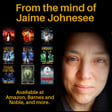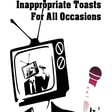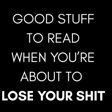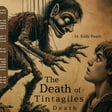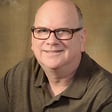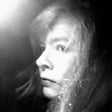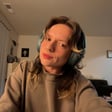Become a Creator today!Start creating today - Share your story with the world!
Start for free
00:00:00
00:00:01

Guest: Author Carson Fredriksen
This week's guest, Carson Fredriksen, is a neurodivergent writer from Calgary, Alberta, who often enjoys rummaging through his dark, albeit unique, imagination to enhance his mundane life. His previous short stories have appeared in such online publications as CommuterLit, Rooster Republic Press, and Howling Wolf Press. In 2022, his short story (Your Biggest Fans) was named an ‘Honourable Mention’ in Tales from the MoonlitPath’s Halloween challenge. A full transcript can be found here.
More from Carson Fredriksen here and here. Check out a free short story from him here. We talk Autism for service workers, B-shark movies, how families inspire horror stories, and Carson offers advice for aspiring writers with autism.
Transcript
Introduction and Podcast Purpose
00:00:02
Speaker
You are listening to The Mentally Oddcast, where we talk with creatives about neurodivergence, trauma, addiction, and all the other things that impact and inform our art. Our goal is to show everyone that no matter what you're going through, you are not alone and you can make art about it.
00:00:34
Speaker
You are listening to The Mentally
Sponsor and Host Introduction
00:00:36
Speaker
Oddcast. My name is Wednesday Lee Friday, and we are brought to you by sometimes hilarious horror magazine. Find us on Ko-fi.
00:00:45
Speaker
today's
Meet Carson Fredrickson
00:00:46
Speaker
guest is Carson Fredrickson. Carson Fredrickson is a neurodivergent writer from Calgary, Alberta. He enjoys rummaging through his dark, albeit unique imagination to enhance his mundane life. Mundane and Alberta, come on, man, you're making that up. His previous short stories have appeared in, ah let's see, Commuter Lit, Rooster Republic Press, and Howling Wolf Press.
00:01:11
Speaker
ah His short, Your Biggest Fans, was named honorable mention in Tales from the Moonlit Paths Halloween Challenge in 2022. Wow, that all sounds very impressive. Welcome Carson, thanks for being here. ah It's very good to be here. Sweet, sweet.
Early Horror Influences
00:01:29
Speaker
So, you know, we like to get started by asking guests to tell us the story of the first horror movie that they remember seeing, so let's have it. Okay, I remember When I was about seven years old, my brother made me watch Friday the 13th, part eight, Jason Takes Manhattan. And it was back in the days when it was on VHS and the clamshells from the video store. And they had the little stickers on them that told you what the genre was. So it was horror. And I'm kind of embarrassed to admit this, but that movie actually really scared me as a kid.
00:02:05
Speaker
I thought Jason Voorhees was just absolutely terrifying because he's just like this undead terminator basically. By that point, yeah. clearly well yeah he's He's a zombie Jason, yeah, basically. so And there was a couple times I remember I had to leave the room a few times because I got too scared. But I always came back in and and I did watch the rest of it.
00:02:26
Speaker
And then I watched it again recently and I'm like, this is so cheesy. Well, it is. But like that one also has like adults that are bad. There's like the teacher, the principal, whatever. And he's just like that guy who's a huge dick that endangers everyone else with his like dickishness.
00:02:44
Speaker
Oh yeah. And that that seems to be a thing in almost every one of those movies. And that's all, there's also the, that crazy scene with like the punks trying to like give the girl heroin or something like, yeah. um Oh yeah. Like for actually that's like one of the more twisted movies. Cause that has a lot of really weird stuff in it that a lot of, cause there's also the student that's like trying to blackmail the the teacher into like,
00:03:13
Speaker
but Yeah, that's that's a wild one. And you said how old were you? About seven, actually. Okay. my My mom was clearly doing something else at the time. So yeah, I know some of my guests, like their parents super did not want them to watch horror movies and they had to sneak around. My parents were not like that at all. I saw I don't know if you're familiar with Mother's Day, but I saw a horror movie called Mother's Day when I was like 10 or 11.
00:03:42
Speaker
and if you are Yeah, i absolutely i am aware of it yeah yeah not not a kids movie, not a family movie. Like I'm not sure I'm old enough to watch that movie now. it's the ah So given that that was your early experience with horror movies, what drew you to write horror?
Canadian Horror Inspirations
00:04:06
Speaker
Well, you know, growing up, uh, I was very lucky because growing up in Canada, there was all these great shows like, are you afraid of the dark and goosebumps and freaky stories. And I basically like, they came on freely on TV all the time and I watched them and I was often scared by them, but I was always like intrigued by them. I always kind of loved being scared when I knew there was no like actual physical danger to it. And then when it was over, I could catch my breath and be like,
00:04:35
Speaker
Ah, good. I handled that like it was so great. And then eventually though, I found, cause later, you know, of course with my condition and of course I also have anxiety disorder too. I learned that when I was able to handle such like scary negative emotions, it kind of helped me deal with like the real negative emotions in real life and all the horrors that existed in real life.
00:05:00
Speaker
and i just always And with writing, I always just kind of really enjoyed it. um Back then, I never really thought I was very good. I just thought, oh yeah, I could write something. And I wrote fan fiction for a few years. But I thought, oh, well, anyone could do that. I'm not especially talented. But then I just started writing my own actual short stories.
00:05:23
Speaker
when the whole pandemic was going on and I realized I really enjoyed writing them and especially with the horror genre I think there's just a whole multitude of different ideas and it's always the most fun to write because you could write about horrors you see in real life or you could write about something completely imaginary or in a different solar system or under the ocean or anywhere so I've always just kind of found it's a whole Well of inspiration for me and I just actually really enjoy scaring people with it and whenever people say they're freaked out by it That's the biggest compliment I can get That's awesome. And I think you really hit on One of the things that I think makes horror have the most value is that it teaches you how to deal with things that you
00:06:14
Speaker
may not encounter in your life. I mean, you watch Jaws a whole bunch of times and then seeing a barracuda in the water isn't very scary, which you know normally it would be, but you've you've warmed yourself up to it. um Yeah, i I love that. and i think Because I think horror You know, I talk a lot about it. It's my genre of choice as well. um And I think that it's still like, like romance is one of the more malign genres and one of the, the kind of genres that if you are passionate about it, you are more likely to be judged for it than if you say that you love dramas or comedies or action movies. Exactly. Okay. So apart from horror, what else do you read?
Debut Novel and Themes
00:07:00
Speaker
um I like to read in a whole multitude of different genres because I always like to expose myself to different elements and come up with new ideas, but mostly I really love works in the fantasy genre such as Aaron Morgenstern's The Night Circus or especially Matt Haig's The Midnight Library, which I consider to be like one of the best books written this century.
00:07:25
Speaker
But I also really love mystery and thrillers because it's always something that, especially when it's done well, that it's something that you have to read to the end. Like you can't just be like, oh, I'll read for a bit and put it down. It's like, no, I have to know like what's going on and where does this lead to. So it always keeps my attention. It always makes me flip the pages, which is what a good book should do. Oh, absolutely.
00:07:50
Speaker
Cool. So I'm aware that you've published a lot of short stories, but you have a debut novel coming out and I was ah looking it up. It's actually like a monster under the water thing, right? It is. It is coming out, um, actually on the 25th of January now. So nice.
00:08:11
Speaker
and it's called Beyond the Deep and what it's about is it's about a kid whose family in the early 90s stops at this local motel somewhere deep in the woods and he sees that they have a pool and it's in this outside sort of shack really and he sees this fin rise out of the deep end and he soon learns that anytime his feet aren't touching the deep end It creates a portal between our world and this other world where this creature lives. And although he's fortunate to escape, some of the others are not so lucky. And then years later, he learns that a new recreation center is being built on top of the land that once housed the motel. And of course, it has a pool. And he begins to wonder if it's possible that creature has come out of hibernation and is seeking fresh victims. Oh, I bet it is, right?
00:09:08
Speaker
That's what I thought because it basically just goes into hibernation and it just yeah realizes it's awake when it begins to hear voices from up above because it can see into our world. It can't go into our world if somebody is standing on the deep end, but it can always see into our world. Oh, yikes. So that that hits on a lot of primal fears because there's always just fear of water in general.
00:09:35
Speaker
fear of the deep end in particular and fear that things that we don't know about might be watching us. So that's that's a lot of pressure points right there. Oh yeah. What's the title? Beyond the Deep. Beyond the Deep. And would you say that you're inspired by any of the people that, like a lot of your famous underwater writers, you know? your're ah Well actually it was more I was inspired because I also saw Jaws as a kid and I absolutely loved it because when I was a kid I was absolutely ah obsessed with sharks and shark movies especially.
00:10:14
Speaker
And me and my cousin used to just watch them all the time, like Jaws and Deep Blue Sea and all these movies. We used to just watch and love them all the time. And it got to a point when when we went swimming in the hotel's pool, she was afraid of swimming in the deep end because she always thought, oh, there's a shark in the pool. And we were always like, oh, really? And she's like, well, is this in the deep end?
00:10:40
Speaker
And it was funny at the time, but it was just one of those ideas that just stuck in my head and just rummaged around and I kind of thought, what if it was possible that something like that could actually exist in a pool and only did exist in the deep end? Okay. Alright, so I am gonna guess that you're also a fan of B-movies about sharks.
Impact of Shark Movies
00:11:03
Speaker
Oh, of course. I know not everybody loves like the super hokey ones. I'm a great fan of those. I now watch Santa Jaws every every Christmas. It's one of my regulars. But I mean, there's so many good ones. Like I was actually fortunate enough as a kid that like My parents were also into horror movies and shark movies, so we saw the Ultimal Squalow in the theater during that two-week stint that it was legal to play it in the United States before Spielberg said, oh, hell no. Oh, yeah. That was that great white shark movie. Great White. Great White is the ah the American release name, but it's an Italian movie. And it's got it's got ah James Franciscus from Planet of the Apes in it, and then Vic Morrow is the
00:11:49
Speaker
like the Queen the Queen kind of character. Yeah. Yeah. And there's a helicopter death in it. And like, it's, it's so funny. It actually is is one of your funnier be shark movies like, ah like shark attack three megalodon, the one that has john barrowman in it.
00:12:06
Speaker
Oh yeah, that's definitely one of my favorites. That's one of my favorites so bad it's good movies. Well, in that one in particular, it I suspected that it was like a directing major's final project and he was showing off how he could use Final Cut Pro to make it look like a shark was swallowing a lifeboat full of people, just swallowing it whole.
00:12:29
Speaker
Even though you can clearly tell it's just a shark coming out of the water and the raft is like superimposed. Well, and they were using so much stock footage. Like if you watch Shark Week, you've seen a bunch of that movie already because they're taking that same stock footage and just putting screaming people into it.
00:12:48
Speaker
But like, the GoShark movies? Like, GoShark 2 is frustratingly well-written. It's like, okay, this guy can actually write a script, so why the hell is he writing GoShark 2?
00:13:02
Speaker
Then again, you know, Thunder Levin is also a super serious screenwriter with, like, actual talent, and and yet he wrote the first four Sharknados, so... Exactly. Well, and the thing is, if you watch the whole series, the whole Sharknado series, it's apparent when he left, because the movies got progressively more ridiculous after the fourth one, but they really stopped being funny.
00:13:28
Speaker
You know, yeah, no, they totally did. I kind of feel it was like they were trying to make them so bad. They're good movies, but I personally think that the best ones of those are like when they're unintentional, like they actually thought they were trying to make something really special and amazing, but it's clearly just a piece of crap. So sounds like you've seen doll shark yeah or cocaine shark.
00:13:52
Speaker
yeah Yeah, and that that really is one of those, like, Carnosaur, like, just jumping on the bandwagon because you heard something else was coming up. Cocaine shark. Because those weren't really even sharks. And i I don't think that was actually cocaine either. Like, not even in the movie. you Like, they weren't even interpreting it as cocaine. Although, I must say, I'm kind of excited for Krak-kun. I haven't seen that one yet.
00:14:21
Speaker
Oh, I haven't heard of that one. Yeah, it's it's kind of new um because, you know, there's a couple of good, like, non-Shark movies that you want to keep your eyes on, like they're making another Velocipaster. Oh, I see. Now, have you seen the first Velocipaster?
00:14:35
Speaker
No, but I certainly heard of it though. You really need to. um The thing about it is it honestly has one of the most spectacular special effects I have ever seen because there is no special effect. They literally show you a shot of the street and underneath it, it says, FX, car explosion.
00:14:57
Speaker
And then they cut to a guy on the sidewalk like falling backwards or surrounded by debris because of the car explosion that did not in fact appear. Plus Voltaire plays an exorcist in that movie. And that's, so you know, you you you can't beat that. Nope, you certainly cannot. and Oh, well, what about Under Paris? What did you think of Under Paris?
00:15:23
Speaker
That one, well, I actually really enjoyed that one. um That I actually didn't even think it was a B-movie. I actually felt I was actually really impressed by how well done it was and how it wasn't about like just trying to get as many shark attacks as possible in a few minutes. like It actually felt like they really wanted to build the suspense to like when they're diving into the thin river, it's so murky and you can't see anything and it's like anything could just be lurking in there. And I actually got like pretty like suspenseful and I actually had to like hold my breath a few times because I thought something was going to happen. And then sometimes it does and sometimes it doesn't. But either way, it was just like, Oh, wow, it's so amazing.
00:16:08
Speaker
And yeah, I was impressed with the work on the gore effects and that I thought the acting was pretty solid. And yeah, I always find those ah kind of movies are always like hit and miss as opposed to if you're going to enjoy them or not. But yeah, I was actually super impressed with it.
00:16:26
Speaker
Yeah, I agree. I thought it was quite excellent. And I certainly did not see that ending coming because that's something my husband and I joke about a lot is like pretty much every movie of that type. Oh, well, how does it end? Oh, it ends with them killing it. What do you know?
00:16:41
Speaker
and but But yeah, spoiler alert, that's not how Underpants ends, folks. and No, it doesn't, actually. it's ah And I was actually pleasantly surprised. It's like, wow. It's like one of those horror movies that actually just goes with the whole ah bad ending, basically. Well, it's yeah, it's very much like a zombie movie ending.
00:17:01
Speaker
You know or were the mist one of one of those most notorious bleak endings Mm-hmm Okay. Yeah, cuz I I definitely would put under Paris as on par with like open water or 47 meters down like the ones where they're really trying and managed to Come have just a lot of suspense I mean you care about the characters just enough that like wow, I would rather not watch them get eaten alive.
Importance of Relatable Characters
00:17:29
Speaker
Oh, oops yeah And i've I've noticed in a lot of horror movies, especially slashers, they tend to make the characters either like really, really stupid or really unlikable or just really bland because it's like, oh, well, we don't need to develop these people because they're going to die anyway. But yet in this movie, it's like, yeah, I actually did like these people. And yeah, it was actually like a pretty positive experience and there. And even like that one girl.
00:17:55
Speaker
who lures all the people down into the catacombs, like is trying to save the shark. And it's like, and I'm an animal lover too. And I definitely want to protect sharks. So it's like, I could kind of sympathize with that, but at the same time, it's like, yeah, it's still a stupid idea, but it's like, I could understand it at least. And that definitely helped out. Yep. Yep. Agreed. So I read your short story called when mom, uh, when's mom coming home?
00:18:22
Speaker
And it was creepy as shit, man. It was it was super creepy. Oh, well, thank you. um That's great to hear. and But like I'm also a fan of family-centered horror. So I have a couple of questions about this. um One, do you have siblings? I do. I have an older brother. Oh, you you said that they were having you watch ah watch horror movies with you. OK. Oh, yeah. And so I assume that this is inspired by your own family? Or or would you rather not say?
00:18:52
Speaker
oh Oh no, it is actually. This is also kind of a funny experience. So I think around that same time, maybe when I was about like seven or eight or so, ah me, my older brother, and my great aunt, because my mom was out at the time, we watched the first scary movie. And this is even more embarrassing than this, but I actually was scared of that movie just because I thought Grossface was like super creepy looking.
00:19:18
Speaker
Like, even in a comedy like that, I still find it a little scary. And I actually got so scared, I actually decided I couldn't watch it. I could handle Friday the 13th of 48, but I couldn't watch Scary Movie. So I literally excused myself, ah because we were watching it upstairs in my mom's bedroom, and I went down to the kitchen, and I sat at our island And I stared out through her screen door and I just waited until she got home. Cause I knew like, okay, once mom's home, I'm safe. Like nothing can hurt me. Cause that's what you believe as a kid is that your parents can do anything. They can save you from anything. And it was funny because this memory popped in my head a few years back. And of course my horror mind was like, Oh, what if my mom did come home, but it like, it wasn't my mom. It was someone or something else.
00:20:10
Speaker
Right. And so, yeah, that was just ah and I just kind of wrote it and it was just like a nice short story. I didn't feel like I had to go on too long about it. And I was very impressed with how it came out. So, yeah, I mean, it's it's a tight little tale. We'll actually have a link to it in the description um because it is available online. and um Family centered horror in general, is that is that a sub genre that you focus on?
Writing Family-Centered Horror
00:20:40
Speaker
Um, I kind of like to do all kinds of different sub genres of horror. Um, I always kind of go with the stuff that scares me more. So anything apocalyptic or anything related to ghost or demonic possession scary or even AI, like that scares me personally. So I tend to kind of focus on that, but family centric horror, um, I think is also very, uh,
00:21:05
Speaker
scaring can be done very well in fact i even wrote another story that's actually going to be published in october actually that's also a family-centric horror story cool well and the thing about that sub-genre is that there's so many different kinds of families You know, because it's it doesn't always have to be like the tight knit loving family that goes on a great vacation and something awful happens. There's, you know, a whole world of like wine moms and angry dads and, you know, just a whole bunch of dysfunctional family. Right. And also lend itself to that. Absolutely.
00:21:44
Speaker
Well, and that's the thing. Is the dysfunction coming from like inside the family? Is it an outside threat? Is it a combination of things? There's like so much you can do with it. Plus it's always relatable because everybody has a family and everybody has a person in their family that is kind of sus, a little bit sketch, you know? Oh, don't I know it. That mysterious like, yeah, we don't say those things in front of that relative kind of relative.
00:22:13
Speaker
So um I was looking over your questionnaire, because you know we have everybody do questionnaires, and you describe yourself as having high functioning autism.
Navigating Social Situations with Autism
00:22:24
Speaker
And I have lots of questions about that, because that's what they're saying about me these days. I have high functioning autism, and I'm like, I don't know what high functioning means, because I'm still kind of a loser at this late date.
00:22:37
Speaker
Um, but, uh, I've heard high functioning autism described as you're just great at masking and you're great at getting by without accommodations. Is that your understanding of the term? Uh, well, as a kid, um, I definitely didn't feel like I was masking cause I never really thought there was anything different about me. Like I just acted the way I thought everyone acted. And I said what was just on my mind and it came freely.
00:23:07
Speaker
And thankfully, I got the support and accommodations I didn't need. But really, it's only in recent years, I've kind of done some masking, but only like socially as the social norm, though, because I think everybody masks to some extent, you know, we smile and nod when, we you know, we don't agree with what people say. We laugh at things that aren't funny, but we try to be polite anyway. We sometimes agree with people's opinions because we just don't feel like getting into a fight with them or sometimes we say that we've seen or done something even though we've done no such thing because we don't want to be the odd one out. So I feel like I do a little bit of masking, but in terms of like my condition, I'm much more comfortable with it and
00:23:52
Speaker
I think it's just one of the many things that makes me unique. So. OK. How old were you when you were diagnosed with autism? I was three years old. And at that time it was called it. Well, they diagnosed me with Asperger's syndrome. So back then that was the thing. But then eventually I think now it's just kind of grouped in under autism or I guess more under the high function autism term.
00:24:22
Speaker
But yeah, that's basically when I was diagnosed. So growing up, I, my mom always mentioned it to me. And she, you know, God bless her soul. She was so patient with me. And thankfully, she was actually a ah teacher at the same elementary school I went to. So she was able to, you know, check up on me and you know, talk to the teachers and see how I was doing. So that is luckily I get I mean, have people aware of it at that young an age. Cause I mean, I'm in my fifties and I found out two years ago that I had autism. So oh really yeah, I need people to go back and adjust a few report cards because I need accommodations. No, it's, well, and yeah I also have ADD, but as a girl who grew up in the seventies, they did know about ADD, but not only was my mom like super resistive to me being tested for anything.
00:25:17
Speaker
They didn't really know how to diagnose autism or ADD in girls. They only knew how it presented in boys. And so if girls weren't presenting that way, they assumed they didn't have it. And now that they know how to diagnose it in girls, it's real, real obvious which girls had it. So there's this rush of women in their forties and fifties that should have been diagnosed 20 or 30 years ago that just weren't and had to, you know, just kind of do the best they can.
00:25:46
Speaker
So no absolutely that's that's a pretty amazing thing that you were able to be diagnosed at that early age. And it sounds like you didn't really have a like a stigma to carry with you with regard to that, that people were not extremely demonstrative about it. I mean, did did you feel like you blended in?
00:26:06
Speaker
Uh, I did. Um, I think I was definitely different, but I think most kids, uh, really, uh, kind of loved me or liked me at least because I was so different. i had I had a couple bullies here and there, but I mean, kids can be cruel in general sometimes. So I, uh, I kind of like to think of it more as just, you know, it wasn't really anything about me or my condition. It was just like, you know,
00:26:30
Speaker
this kid was, especially back then in the 2000s, like early 2000s, especially, it was like, Oh, this kid's different. Let's pick on him. But yeah, eventually, especially when I got to like junior high in high school, I pretty much fit in and everyone accepted me for who I was, which was great.
00:26:48
Speaker
Yeah, that's handy. That's handy. Yeah, I was a fat, weird girl with a dumb name, so I i didn't really have that experience. but that i mean so So when did you start writing with an eye to publication?
Pandemic Writing Journey
00:27:05
Speaker
With an eye to publication? Yep.
00:27:08
Speaker
Um, well, I think it was like right after the pandemic started. Um, and I realized that, and it was sort of one of those light bulb moments. Cause before then I was totally lost on like what I wanted to do with my life. I wanted to want to be in my life. I initially thought, i well, actually growing up, I had a whole.
00:27:29
Speaker
multitude of different things I wanted to be like one day I wanted to be an astronaut the other I wanted to be a janitor the next I wanted to be an actor and then a voice actor but then once the pandemic hit and I sort of had that sobering moment I was like oh I never got to write all the stories I wanted to write and so then I was like oh maybe I could just start writing them and at first I never had an idea I never knew that like people were actually going to accept my work like I just wrote just because I really enjoyed it and it was just kind of a night like fun break from reality and especially after work I could just do that but yeah now uh yeah four years uh and that was about four years ago I started writing that so and I'm very happy with the way things have turned out lately so let me ask you this what have you discovered about yourself since you started writing fiction uh my imagination goes a lot deeper than I realized for one thing
00:28:27
Speaker
But also that I, words really had the power to affect people and I could bring my own fear to the table and face them head on and kind of help deal with them in real life. But I've also learned it's just such a great, like I said, break from reality and it was just a fun thing I could do. And it kind of was like sort of my decompression time where I could just, you know,
00:28:55
Speaker
forget about my problems or what's going on in the world and just, uh, focus on my characters and the stakes involved or what I could do to make something scary or beautiful or anything like that. For example, like my, I had a cat a Chevy who sadly, um, I had to put to sleep four years ago because she was getting old and, you know, had problems with her bowels. So I know, but I wrote a story in which, uh, a man's cat also dies.
00:29:23
Speaker
But it comes back to him as a ghost and basically shows him all the realities this cat could have lived and says that despite you know my un time untimely death, I'm still happy I got to be with you. So writing that, just I think, just helps me with emotions like that. So that's, I think, one of the best things I've discovered with writing.
00:29:45
Speaker
so Well, yeah, I mean, writing is such a ah vital coping tool, especially for people that are less demonstrative about their thoughts and emotions. You know, people that aren't as a vocal or outgoing tend to use writing ah that way, you know, as a way to to cope with things or to get your emotions out. It's a good like venting tool. And it's interesting. Yeah, exactly. Because it's it's their voice, like it's like, probably their strongest tool, really, like, you know, their voice and their words and their power do have power.
00:30:24
Speaker
Yep, absolutely. Well, and you also mentioned fanfic, which is something that like I had to learn about. I was initially really down on the very concept of fanfic. I, I actually referred to it once as literary masturbation. And I took a lot of heat for that, even though I'm very pro masturbation, um, that, uh, that I was, I was real snooty and judgy about it not being, you know, quote unquote, real writing.
00:30:51
Speaker
and and I really had to like learn and adjust about that because what I discovered is that a lot of people do fanfic, they they write fanfic and and read fanfic because not only do they want more of these properties that they love, you know all these different IPs that people do the fanfic in, but also it's a way to explore feelings and situations and characters without having to do a bunch of world building, you know, because everything is already set up for you. You know, these people, I hate to use the turf as an example, but like, we know who Harry Potter is. We know what Hogwarts is, you know?
00:31:34
Speaker
If you say, you know, they went to Diagon Alley, we already know what that is. You don't have to spend three pages telling us everything about it because it's all there. And you can just get to the part where you're wrestling with the emotions and, you know, dealing with the situations. So, yeah, I i ah eventually figured out that Fanfic had a lot to offer people that use writing as a coping tool.
00:32:01
Speaker
Oh, no, absolutely. And I know it gets a bad reputation as cringy or stupid. Well, it and it can be, but so can original stuff. Oh, absolutely. Oh, please go ahead. Oh, sorry. No, I just learned that like when I really dug deeper, I learned that there was actually a great deal of very well-written fan fiction, even I think stuff that is better than some of the properties it's based off of.
00:32:28
Speaker
And yeah, it really, and in hindsight, it was a great thing. I learned that because that really, I think helped me, uh, as a writer, because obviously they tell you, uh, Oh, like and when they you say, Oh, I want to be a writer, what should I do first? The first thing they say is read more. So reading such great work like that really did help me, uh, to write better. And especially after I wrote more of my own stuff, uh, my own fiction like that.
00:32:53
Speaker
And I got more and more positive reviews and people saying like, wow, like this is so well written and felt like I was watching the deleted scene. It was just like, wow. Like that was the first time I was like, wow, I'm actually good at this. Like I actually could do this. So that's been monumental in my help. So, you know, I just had the best idea. I think we need to take a bunch of B shark movies and like fanfic them, but the fanfic should be like super incredibly serious.
00:33:23
Speaker
like a like a doctor that decides to dedicate his life to understanding how sharknados happen. and yeah right yeah and And his wife just doesn't understand it. And they have all these huge arguments about it because she's trying to wrap her head around why he would dedicate his life to stopping sharknados. And he's like, well, but they're sharknados. Yeah, it's like they could happen anywhere.
00:33:47
Speaker
We must save the Velocipaster. um and but Alright, so I'm like frantically writing that down so I don't forget. Don't you hate that when you have an idea and then you can't remember it later because you weren't able to write it down?
00:34:02
Speaker
Yeah. Thankfully I got, I got this app on my phone that's basically just like a big word pad. And usually, uh, usually like when I'm stoned or something or drunk, like when these ideas come to me, um, I initially I pull up that app and I'm just like, Oh, I type it all down. And then I'm like, I'm so glad I did. Cause I totally forget about it either. Like a few minutes later to like the next day. And then I look it up and I'm like,
00:34:26
Speaker
Oh, yeah, right. That was a good idea. And sometimes I act on it. Sometimes I don't. But either way, it's like I'm glad I at least thought of it. So yeah, I have this weird thing where actually not all the ideas I have when I'm stoned are as brilliant as I think they are at the time. yeah they They're fun and creative. But yeah, it's like they're not always viable. Like you don't know if you could actually write it. so
00:34:52
Speaker
Um, so let me ask you this, um, but how do you think that your autism influences your output at all?
Unique Perspectives from Autism
00:35:01
Speaker
Oh, absolutely. Um, I find that when I'm, uh, because I am super passionate about writing nowadays and I certainly do want to get more stories out there and, you know, hopefully write some more novels. So yeah, I find that when I dedicate myself to,
00:35:18
Speaker
Because my my writing goal, I try to either finish a chapter or try to write 500 words. So I find because I'm so dedicated to it and I'm so passionate about it, I just have this laser-focused guidance that just makes me just write out anything. Even if I have that nagging voice, of course, that tells you, ah, this is crap. This is never going to work. So that definitely helps, I think.
00:35:42
Speaker
Interesting. So what about in terms of subject matter? Do you think that the the kind of awareness that you develop as an autistic person, does that impact the subject matter?
00:35:53
Speaker
Sometimes, I think because because speculative fiction in general is all about seeing things from a different angle or things completely removed from reality. And because my brain is just naturally wired differently from a lot of people, it just allows me to see the world in a different way and kind of allows me to think of these ideas that kind of exist outside of reality.
00:36:16
Speaker
And mostly, especially in horror, I'm just like, Oh, what if it was like this, but darker? What's the flip side of that? Or Oh, what could be some scary, dark things that come from this event, let's say. So no, I think that's definitely like my biggest asset. In fact, I would even say that's like my competitive advantage, really. So cool. Wait, so do you have a day job right now? um I do I work in a warehouse as a laborer.
00:36:45
Speaker
And it's a very physical job. I do a whole lot of different tasks ranging from receiving items and skids that come in to picking order to even loading and unloading trucks and trailers. But I'm I find that it's ah not only it's ah helped me to keep very physically active, but I find at the end of the day when I go home,
00:37:09
Speaker
Uh, I'm more able to just like relax and just like flex my creative muscle. Cause it's like, okay, my body's done enough work. Let's let my mind do some exercise now. So usually I'm able to do that. so Well, and I would imagine that while that work does sound physically exhausting, it does not sound emotionally exhausting.
00:37:29
Speaker
cause i know i know that yeah No, it certainly isn't. It's ah very predictable, I'd say, for the most part. like I know like what I have to do, what where you where most things go on the shelves, and yeah, especially what's required of me. and yeah The people are great and they're super supportive of me, and yeah, I fit right in. so That's pretty cool, because I know I spent a lot of years doing ah like retail, food service, fast food management, stuff like that, despite having a degree. But I talk to a lot of writers that when they have like front facing jobs, they are so emotionally exhausted at the end of the day that they just don't, because I mean, dealing with the public is fucking exhausting.
00:38:16
Speaker
Particularly like yeah turns out if you're autistic and you don't know that it's even more difficult because it it I think that people Like like you were saying earlier people don't always have a handle on how often politeness and and decorum in society means that you lie and yeah Yeah, to an extent. And if you have like ah an innate sense of like justice or or truth, not even in like a Superman way, but just in a, well, why would I say that if that's not true? That doesn't make any sense, make it make sense. you know Whether it's like explaining to to people at at a customer service desk, like oh, well, we actually didn't make a mistake. You didn't read this very clear thing right here, and that's why you didn't know what happened.
00:39:06
Speaker
but you can't say that to people, you have to coddle everyone and protect. Yeah, no, which it which thankfully in my job, um because it works as both a warehouse and a retail environment. Because in the front, we have a retail section where customers can come in and request things and they they go to the back of the warehouse, which is where I work. But thankfully, because I work in the warehouse, I don't really interact with customers or people that much. And Especially if I'm just doing stock I'm just left completely by myself like I just like I'm left alone I'm just left alone to my own thoughts and sometimes that's where ideas come from or I just kind of think about a story I'm working on and Yeah, it just kind of gives me this whole Space to just think of new ideas and think of Different scenarios my characters could go through or even just some random ideas. So no, that's definitely ah very helpful. So I
00:40:01
Speaker
That's really interesting because I talk to so many, not just writers, but musicians and and visual artists and filmmakers. And more than anything, they just want to make enough money at the creative side of their life that they can quit their day job. But it doesn't really sound like that's on your mind.
00:40:20
Speaker
Um, it is on my mind, but i' I'm just kind of, I guess, I guess and to some extent, I'm ah a bit realistic because I know like I'm not, success doesn't happen overnight. And you know, I certainly, uh, like I, I, I do have a book coming out now, but I know it's probably not just going to make me instantly like Stephen Kane overnight. Like I know. It's like a very ah marathon, not a sprint. So I just, uh, I would, I would absolutely love to just like write full time. That's definitely like my dream job, but it's kind of in the same vein of like, Oh, I would really like to win the lottery, but I know it's probably not going to happen. So I'm just happy that I would love to keep writing, keep entertaining people and just keep enhancing my craft. Nice.
00:41:06
Speaker
Nice. Well, that leads me to a question I was planning to ask, which is what is, is there something like maybe a specific sales goal or an award
Defining Success in Writing
00:41:17
Speaker
or a review from a specific person, something that would make you feel like you, quote unquote, made it as a writer?
00:41:26
Speaker
Is there such a thing in your mind? Well, as a well as a horror as a horror writer, I think if I had a glowing review from Stephen King, that would be like you know for winning the Academy Award. That would just be amazing. right that's that To me, that's like you really made it as a writer.
00:41:43
Speaker
But otherwise, like, no, I think it's kind of just reflecting what I just said a few seconds ago. um No, it's mostly just ah I would just love to if I knew that I could just sustain myself on writing, then I really knew I made it as a writer because I don't feel like I need to win a Pulitzer Prize or have like a street named after me or like have a short story contest named after me. It's like I don't really need any of that. I just want to keep I just want to like keep writing and keep working at it. And then hopefully, if like I could make a living off of that, then I could sit back and be like, wow, I have like officially made it. Nice. Nice. Well, I have to say, dude, um you have the same last name as a character in one of my all time favorite movies. It's not even a horror movie. um Well, you know, Mr. Fredrickson from Up.
00:42:35
Speaker
oh Yes, ah although it is spelled differently which is Very interesting because a lot of people when they say Fredericton they think you spell with a C in between the I and the K. but it's like No, it's just r-i-k at the end. So it's good. Yeah. No, I did share. yeah Oh, yeah Well, my dad's side was Norwegian. So okay so but yeah, no, it was funny though because because his first name's Carl and I actually had a grandfather named Carl. So yeah, I actually can say that. Cool. Um, so we, um, we do often ask our guests with consent, um, to talk about a time when they felt, uh, genuinely in fear for their life. And you indicated that you do have something that you want to share about that. So please do.
00:43:34
Speaker
and Okay. Well, um, I guess, yeah, essentially just when the whole pandemic officially got declared by the WHO, that was a really terrifying moment. Cause I realized, um, I, being because I was born in 1994. So I like pretty much grew up like pretty peaceful and happy. And like, I didn't even have to worry about like the cold war or anything like that. So it was like very peaceful. And then.
00:44:03
Speaker
Suddenly there was this big thing where this thing that we thought was just going to be a little problem became a big problem. And again, in my condition, I always like certainty. I like to know what's going to happen and how I'm going to handle it. And this was just like pulling the rug out from under my feet and having no idea what was going to happen. I didn't know if I was going to get sick. I didn't know if my family was going to get sick. I didn't know if I would still have a job throughout everything. I was worried about like how.
00:44:33
Speaker
other people in the world were doing because I'm very empathetic. I kind of take on a lot of other people's problems and worry about it. So you know, I feel why you must be having a hard time right now. My goodness. ah Yeah, well, that's a I'm trying to like just remember to yeah, like definitely support your sympathy, but definitely don't carry everyone's weight on your shoulders. So And so, but basically, but basically though, it was like, anyway, so it was that one time when I realized that I was like, I had no idea what the future was going to hold for me. But yet there was like a ah positive or a glimmer as like my mom likes to call them, uh, that came
Writing as a Pandemic Coping Mechanism
00:45:15
Speaker
out of it. And it was just like, yeah, I just discovered I really enjoyed writing. And it was like, I found out it was a coping tool. It was something that was a lot of fun. It was something I loved doing.
00:45:26
Speaker
And it was, I knew that it was something that I wanted to do for the rest of my life, because even after rejection, because I've gotten plenty of rejection, uh, and even after all the rejections and after all the, uh, ideas that sometimes don't come with fruition or some stories that I write that I abandoned because they didn't work, which I have a few of those too. I even started work on one book that I got about 71 pages in.
00:45:54
Speaker
before I was just like, eh, this isn't doing it for me. So, and, but even despite all that, I was like, you know what, I'm glad I did it anyway. Cause I'm having so much fun with that. So it was definitely the time I was most afraid for my life, but at least I'm, I can kind of look at the flip side and be like, okay, like what did this teach me? What did this, uh, make me realize? And it it kind of made me realize I'm actually a lot more resilient than I give myself credit for. Well, that's a great lesson.
00:46:21
Speaker
Yeah, absolutely. So, and especially in this day and age, it's just something that just keeps reminding me of that. so Yeah. Yeah. You mentioned you didn't want to talk religion or politics, which is a huge hunk of what we do around here. So I actually, like I was super stressed about it. I'm like, wait, so I can't take any question in that direction. What do I do?
00:46:44
Speaker
ah Well, because I'm super progressive and super out loud and proud about it. And so and and I'm also you know like like you, i'm I'm empathetic. And injustices, I like focus on them and they make me furious. And it just feels like everything in our government is one giant injustice right now. Oh, yeah. Yeah. it's but's um but you know Yeah. And I do a bit of a doom scrolling too. Like I try to look up some positive news, but then it ends up just getting worse and worse and worse. Oh my God. If you're on any meta platform, that's all you're going to get because that's what they want. They want everyone angrily responding to everything. So they're only showing you things that are going to be upsetting. Yeah. Yeah. Well, thanks. Yeah. Thankfully I was able to mostly distance myself from social media because I didn't really enjoy it much anyway, but.
00:47:39
Speaker
especially nowadays, I think especially after 2020, I was just like, yeah, I think I'm done. Like I do have a LinkedIn account, but I mean, that's mostly business. And thankfully, I'm actually subscribed to this one group that is about writing. And it always has these like positive mantras and quotes on it. So it's actually kind of nice to like, pull it up and be like, wow, that's a nice thought, actually. So I'm just gonna keep it like that. So no So thankfully I was able to kind of take a break from all that because I just realized it wasn't making me happy and I would probably be better without it. so And I knew that would probably be a detriment to you know my possible success as a writer because I knew like a lot of writers have social media, but I was like, you know, it's a small price to pay for having better mental health and being able to sleep better. So I definitely don't regret it.
00:48:33
Speaker
so So what's your marketing plan then? Well, I like to be interviewed on podcasts. That's always a good start. Well, if you can find some fool to invite you. But no, I do have a website though, CarsonFredrickson.com. It's like my blog, basically, where I try to post things on there.
00:48:58
Speaker
And yeah, I mostly post on there and I mostly just like I said, just keep writing, keep sending stuff out there. And yeah, I get invited to interviews. This is actually the first interview I've ever had, but hopefully I'll get more. Oh, no way. So, yeah, no, this is the first one I've ever been interviewed for that's not been for a job. So.
00:49:21
Speaker
Wow, too bad we're not hiring. I know, right? so So if you ah wanted to offer advice to people with autism who want to become writers for publication, what kind of advice do you think you would have to offer that is unique to you?
00:49:42
Speaker
I would say if you have an idea in your head just write it down. Just get it out of your head and get it onto the page or even the paper if you prefer to write it longhand because even if you and like don't worry about what people might think of it. Don't worry about if it's going to sell or not. Don't worry about like what direction you want to take it in. Don't worry about like what kind of genre it is or if it's a mix of genres or even something completely different. Just write it down on the page because honestly, you'll probably be more likely happier that it's actually on the page instead of just stuck in your head and possibly forgotten, which is possibly the worst thing to do. Hmm. would, yeah, I would definitely agree with that. Um,
00:50:30
Speaker
Have you ever done the NaNoWriMo? I attempted it, actually, like the first book that I mentioned that I wrote, I tried to do it that way. And then that kind of petered out. So I was just like, if no, thanks like that. And that was like a tough decision. But at some point, you're just kind of like, ah yeah, I'd rather just put my energy towards something that I am passionate about. And I want to see come to an end as opposed to something you're only like mildly interested in or slightly interested in.
00:51:01
Speaker
And so there was that, but I also, um, yeah, no, but other times like, uh, beyond the deep, that was one I actually started to work on in November. Cause it was one of those ideas, like I said, that's just been rummaging around in my head. And I was like, Oh, I can make it into a book. But then of course, there's always that, you know,
00:51:21
Speaker
devil's advocate of your brain that says, Oh, well, you know, might not actually be long enough to be a book or might not actually work out, or you might not have like good characters or pacing might be off. And it's like, you've never written a book before. You've only written short stories. How good could it be? You know, you know, shit like that. And so basically, but then eventually I was just like, you know, what the hell, I'm just going to start writing it anyway.
00:51:44
Speaker
And I never did finish it in November. It took me about ah about four months to complete. But either way, it was a good excuse just to get an idea down on the page and just keep writing. And that's actually one of the more fun things I've learned about writing is just the rough crappy draft, like your first draft. yeah you don't have to worry about if like the story works or if the plot works or if it's consistent it's just like okay this happens then this happens then this happens because of this and then yeah you just wrote it and i found that nine times out of ten what i wrote was actually better than i thought it would be
00:52:22
Speaker
Yeah, it's always nice when you have that like, I mean, I like to write something and then set it aside for a while and go back to it. And cause I always remember everything as sucking and not like matching what I'm trying to do in my mind. But sometimes when you go back, it's like, wait, this isn't as bad as I remember. This is actually quite competent. Yeah. That's a great feeling when that happens. Totally.
00:52:47
Speaker
Totally. so um So if somebody is unfamiliar with your work, um but what where would you say is the best place to start? I would suggest going to my website or even just googling my name, Carson Frederickson, and then finding, because that's what I find a lot of people do nowadays, is that if you're wondering who someone is, you just Google them and then it's like, oh, they're this and this person. Yeah, don't ask chat GPT because they will lie to you about who people are. Yeah, exactly. But no, I would suggest that going to my website or like I said, googling my name and looking up my short stories because I find that
00:53:27
Speaker
Horror works the best in a shorter format, and I've had quite a few stories already like published online so far. And you're familiar with Camp Crystal Lake oh yeah Publishing. They do the Flash Fiction Contest. And a couple of my stories have actually been ah honored as nominations, actually. I've never gotten the first, second, or third place. But I have actually gotten honored, though. And I've gotten people liking and commenting on it, which was amazing. That's awesome. So I would suggest that, yeah, no. So I would suggest starting with that first and then maybe
00:54:04
Speaker
If it's their cup of tea, they could check out my book. Okay. And you said that drops next week? Uh, yep. On January 25th. Okay. So it will have dropped by the time this episode airs. Oh yeah. So you can get it now, now, now, hey after you're done listening to the episode, obviously. Oh yes, of course. and so ah But yeah, no, it's, uh, yep. It'll be coming out on Amazon and thankfully it'll be both a paperback and an ebook copy.
00:54:34
Speaker
Cool, cool. Who did your cover? ah Mia Dahlia. If that name rings a bell. Actually, yes. She's going to be in our magazine next month. Oh, yeah. No, she's definitely a talented writer. In fact, one of her stories actually got featured in the Camp Crystal Publishing shallow fiction contest, which was amazing.
00:54:59
Speaker
And yeah, and and thankfully I kind of after because I sent it out to a few places but then I sent it out to my publisher right now and and They actually accepted it and it was incredible and after that I kind of figured oh the probably asked me for a cover so I literally drew this kind of idea that I had of like somebody's leg in a pool and then this like you know, thin hand cloth thing is coming out from the depths to depths to grab them. And so I drew it and then Mia, who, you know, was amazing to work with, uh, took that and turned it into something really creepy and memorable and even gave my name, like a cool, like white and red text to it. oh And I was just like, wow, this is incredible.
00:55:49
Speaker
Cool. Yeah, actually it's funny cause she did send us a great story, which, which I accepted. Um, it was like a perfect fit for the issue. And then when I sent the contract, I had spelled her name wrong cause I, you know, spelled it like the flower and like, whoops. And she was so cool about it. Well, and the thing is I get pretty salty when people spell my name wrong because my name is Wednesday, Lee Friday, and everyone should know how to spell those things right now.
00:56:18
Speaker
You know, if if you're an adult in the work world, Wednesday should not be something that you still can't spell. Yeah. So then when people, yeah, you know, it's like people ah like misspell my last name, like all the time. It's kind of a joke, like, you know.
00:56:32
Speaker
Uh, if I had a nickel every time it happened, I, you know, wouldn't have to work anymore. Oh, I, I definitely checked it twice. because Yeah. So, but I mean, but at least I could understand why people might say, uh, put a C in Rick or even spell it S O N because it's Fred Rick's son. And they don't think, Oh, there's an E goes there, but it's like, and they don't think, Oh, there's an O that goes there, not an E, but it's like, yeah, no, it's Fred Rixson. In fact, one of the places that published my story actually spelled it, uh, Fred er Rixson.
00:57:01
Speaker
So it's like, oh, that's just my alias now. Yeah. I have a friend actually who, um, her, her actual name and her, uh, pen name are really close, but her pen name is basically the way that people typically misspell her name. Oh, really? Yeah. She just used it as a pen name instead of like correcting people over and over and over again. And she, she actually, um,
00:57:31
Speaker
got picked up by a major publisher because of fanfic. She was writing a bunch of Sherlock fanfic and ah an agent side and was like, wow, you're really talented. Would you like to you know have an agent? And yeah, she did. so So yeah, another reason to get into fanfic too. Oh, absolutely. yeah I never know what might happen. so ah So what are you looking forward to in terms of books and movies that are coming soon?
00:58:01
Speaker
Well, what's kind related to horror or just kind of like any movie? Well, I mean, I would think a lot of it would be horror, but in general, you know, what what are you looking forward to? Well, I really am definitely looking forward to Osgood Perkins, The Monkey. You know, I was just going to say, I hope I i saw it because I saw long legs and it was unbelievably creepy. Like it was so good. And I realized this guy was so good at writing horror.
00:58:29
Speaker
And then I found out, wow, he's adapting one of Stephen King's short stories. Uh, yeah, I'm interested. Well, that's the thing. When I first saw a thing, I'm scrolling on Facebook and I see Osgood Perkins, James Wan, Stephen King. And I'm like, this is a prank. There's, there's no possible. Oh, and it's coming out in February. Yeah. Shenanigans. There's no way that's real. That's too perfect. And then there was a trailer.
00:58:56
Speaker
oh Yeah, and it was like yes super creepy. So yeah, I'm definitely excited for that and I'm also excited for the Hard Eyes movie that looks like a fun Valentine's Day flasher. Yeah Yeah, it's got real my bloody Valentine vibes, right? it's like it's nice to have another one on the shelf for those movies so and oh and especially I think the biggest one though I'm excited for is 28 years later and Well, I've loved the other movies and the fact that Danny Boyle once again is returning for this. And I actually saw Nosferatu in the theater and the trailer for that movie ah was like before the actual movie. And yeah, seeing it in like a theater was like, wow, okay, this is amazing. So yeah, that is probably the one I'm most excited for. Cool. Well, yeah, I definitely want to talk some more about Osgoode Perkins. So you said you saw Long Legs. Have you seen any of his other stuff?
00:59:51
Speaker
I have not actually, but I think I will now though. Yeah, I would i would ah recommend it highly. the one ah you know The one, I forget the title now with the girl school and devil worship and stuff. He's he's very into the scary Satanism thing.
01:00:10
Speaker
which I think- No, absolutely. I think that turns off a lot of people because it's so like not based in real life Satanism, but i i just like i'm ah I'm a member of Satanic Temple. I give them money regularly because I think they do good work.
01:00:27
Speaker
But I also appreciate like Satanism as a genre. like You don't have to believe vampires are real to to watch a vampire movie and enjoy it. So to me, that depiction of Satanism is just a genre. It's not any sort of like depiction of real life.
01:00:49
Speaker
Oh, absolutely. But I think especially just Osgood Perkins is just kind of one of those people that just like, really understands horror and what makes good horror and like how to like, and also how to make a good horror movie. Well, he certainly got the pedigree for it. My goodness. I mean, so yeah, no, definitely excited to see more of his work. And it's also great that just studios like A24 and Neon are producing these independent horror movies now, because I sort of feel that's more what people want to see nowadays than movies. so Well, and the thing is, even if a experimental movie is not to your taste, like I did not enjoy Skinema Rink, but I'm really, really glad it exists because I'm glad that people are funding movies that make those kind of choices. you know i'm also yeah I'm also proud it was filmed in my home province. Oh, really? Neat. It was filmed in Edmonton, actually.
01:01:43
Speaker
Oh, I forgot they filmed like everything in Canada. I found that out when the X-Files was a thing. Oh, yeah. And the Last of Us, too, because they actually, some of those, actually, one part of the episode was actually filmed in my hometown, actually. And it was actually filmed kind of like down the street where I grew up, which was amazing. Neat. Neat.
01:02:06
Speaker
Wait, so I was going to say something. Oh, I was going to, I was going to talk more about Osgood Perkins, I think. Cause, um, oh yes well, you know, he was in, um, he had that little cameo in psycho two playing the young Norman, which I don't know. Have you, have you, have you seen all the psycho sequels? Cause some people would say there's too many, but I think there's just enough. Oh yeah. as and No, I have actually.
01:02:32
Speaker
Yeah, it it's it's so neat because Mick Garris, the who directed Psycho IV, is actually pretty active on the meta platform. So I've gotten to actually talk to him about Psycho IV several times.
01:02:43
Speaker
Oh yeah, he's very sociable and outgoing and willing to talk about his movies or even any other movie in general. And I actually didn't know that and I talked some absolute trash about the ending of his version of The Shining and he saw it and And it's a drag for me because my name is is memorable. So people tend to remember when I say something insane online. So yeah.
01:03:14
Speaker
but But yeah, I was always a ah fan of Anthony Perkins, not just for the Psycho movies, although I love them all. He always had such a good handle on playing mentally ill characters. you know like Fear Strikes Out is just pitch perfect, and I will always, always hate ah the movie reviewers that bashed it. Oh, really?
01:03:39
Speaker
Yeah, that's like my whole like hatred for Gene Siskel and Richard Roper and like all those guys are just like, nah, you know, get to say Fear Strikes Out is a bad movie because Anthony Perkins doesn't, you know, that he obviously didn't play baseball.
01:03:55
Speaker
That's not a movie about baseball any more than exactly you know, that's like saying, you know, the guys on Walking Dead don't look like they've ever actually shot a zombie. Like that's not that you don't have to but exactly, you know, they just kind of pick it apart like that. So and it's kind of the I was like,
01:04:14
Speaker
It's like this one joke I heard where it's like, I feel like it was almost illegal for critics to give good reviews to horror movies back in the day. Yeah. Cause they were always trashing them, but of course people were like, Oh, I want to go see it because you hate it so much.
01:04:28
Speaker
Well, Siskel and Ebert hated slashers. Like, they both seemed just personally offended by the entire genre. All the Halloween movies, all the Friday the 13th movies, they just bashed and bashed and bashed. And even as a kid, I was like, well, why do you go see it then? No one's making you. and And actually, there was this one cool story, though, I read that this guy actually worked with Roger Ebert And his son, um, wanted to say to his dad, like, and his dad was like, Oh, like, you know, my son really loved your show, but he totally disagrees about your horror movie reviews. And Roger Ebert actually wrote back to him saying, disagreeing is good. It means you know your own mind. And I was just like, wow, that's cool. Nice. Oh yeah. I would agree. That's, that's pretty positive. Nice. Nice.
01:05:23
Speaker
All right, I'm just looking over my list, making sure we covered everything. Was there a was there anything that you wanted to talk about that we did not get to? um No, I think that was about everything. I mean, I might think of something i might take of something later being like, oh, I should have brought that up, but... Well, you know, you actually mentioned um smoking weed and getting drunk. um um i use I used to smoke weed, but then it was kind of like not so good for my lungs. I didn't really enjoy it. So nowadays I'm actually more into the edibles now, which now they come out with ah drinks now.
01:06:01
Speaker
and which I actually think are more effective because they they kick in a lot faster and there's a lot of great flavors whether it's like soda or tap water or sparkling tap water basically. I saw Amazon had like weed soda but I haven't bought any yet it seems kind of expensive and I didn't think it would taste good.
01:06:21
Speaker
I know that's the downside, but then it's like, and then you look at the flip side and it's like, Oh, maybe this is teaching me that I shouldn't do so much of this. Cause you know, it hurts my bank account. You got a point because I'm doing a dry January right now, uh, which I try to do every year. And of course it's like, Oh, like some days it's like, Oh man, I wish I had a drink. And it's like, Oh yeah, I'm not drinking. So it's like, Oh, just do one of these cannabis drinks instead. Yeah.
01:06:50
Speaker
yeah I don't ah drink very often, but I'm pretty sure I'll have a drink on Monday, um just because, you know. ah Oh, yeah, absolutely. Yeah, I think the last time I had, well, I had two drinks on election night, and because like I was a Kamala ambassador, so I was like super, super pumped to take at least Michigan. even it it It really did not occur to me that it it could go down like it did. like yeah so i I just didn't think it was possible.
01:07:21
Speaker
but then I started getting nervous and I ended up having a couple drinks. But let me ask you this. um What is the relationship for you between between writing and smoking and weed or in taking weed in whatever form? Is there one? um Well, I think it differs for a lot of people. um I think for me personally, it just kind of most for the most part, like especially when I'm just like Netflix and chilling, it just kind of relaxes my brain.
01:07:51
Speaker
And I find that the best ideas come when you're not really thinking of anything or not really trying to think about writing or trying to solve the story dilemma. And you're just sitting there and just randomly a thought comes in your head and you're just like, Oh yeah, that would be a really good story. And despite what I said earlier about like trying to get everything down on either paper or my app, sometimes I do just kind of let ideas come and go. Cause sometimes it's just like,
01:08:18
Speaker
Wow, that's a really good idea. Maybe it'll be something someday. Do do you have like a big idea file with where you keep all your ideas together? ah Kind of. Basically, it's just a bunch of different notes on my app. So yeah. And sometimes I go through and I'm like, Oh yeah, that was pretty good. or Oh yeah, I did that. Or no, that doesn't work. So Okay. So do you have any questions for me? Cause I do like to give guests an opportunity to ask me something if they want to. Uh, yes, I do actually. Um, I understand that, uh, running your own independent publication takes a lot of time and effort, but what's like the one thing that makes it really rewarding for you and makes you glad you did such an independent publication like sometimes hilarious horror.
01:09:10
Speaker
um My favorite part is ah telling people that they got accepted, um selling ah sending people their first contract. people i mean that's you know Publishing people that are being published for the very first time is super exciting.
01:09:26
Speaker
and the fact that we I say we're able to pay people. Right now, I'm like selling off collectibles to pay our writers. but you know I really believe in what we're doing. The stories that we're getting are so good and it gives me such joy to not only help these writers feel more legitimized because they're getting paid for their work and it's getting published and more people are going to see it, but also just to be able to to share so much great work with people.
01:09:57
Speaker
that like that's why I really wish we could you know grow the audience more. It's not so much like, oh, I want people to pay me for this magazine. But the work is is so good and everybody is just so passionate about what we do.
01:10:11
Speaker
there are writers from all over the world that are sending me work. I'm publishing guys from like Poland and Ukraine. And it's great because you know we we pay ah for for unpublished stories, we pay $25 a piece, which means that any writer that we publish is able to then join the Horror Writers Association as a ah as an affiliate member. That gives them the requirement to do that if that's something that they wanna do.
01:10:39
Speaker
And no really it makes me so happy to be able to to provide that opportunity for people. ah Well, that's great. That's very nice to hear. Yeah. and And it's just, I mean, I'm so proud of it because really I started sometimes hilarious horror as a Patreon for myself. And the point was to keep me writing short stories on a regular basis because I would be accountable to people. you know And accountability is a big motivator for me. And then I was trying to think of ways to make it more valuable so that people felt like they were getting their money's work and worth. And I said, well, I'll just turn it into a magazine. And then i you know the magazine itself, like the design was good. We got a great logo.
01:11:24
Speaker
and And I said, well, this is stupid. I shouldn't have a magazine just for me. I need to be publishing people. I know so many great writers. And it just kind of grew from there. And once people found out that we were a paying market, I just got deluged with all these wonderful submissions. We actually had to close submissions. They're closed right now until I get the next issue out next week. It's actually the same day as your book. It's the 25th. Wow. Yeah.
01:11:52
Speaker
Yeah, so so once the next issue comes out, I can open up submissions again. we're We're full for the issue after that, but we will be looking for stuff to publish in the fall. and we are also We also um are looking for cover art as well. We we um can only pay $25 for cover art, which is certainly not considered a professional rate. um So we we want to be real upfront about that. that We can't pay a a professional rate for cover designs, but it is still kind of cool to have your work on a magazine cover. so Oh, absolutely. well and we've also We've had some great artists too. We had Grayson Wilcox do a cover and they are just
01:12:32
Speaker
But, I mean, everybody does these wonderful little horror things. Um, Quinn, Rowan, Dex has done a couple of covers for us now and they are wonderful. So we're really fortunate in that way. And in fact, now that I know that, that Mia Dahlia does visual art, I'm going to hit her up for a cover two, I think. Oh, I do recommend, i do I would recommend it. She's done an amazing job with it. So sweet, sweet. I will definitely pester her about that.
01:12:59
Speaker
Yeah, and she's very good with corrections too, because when she did the cover initially, the nails or the claws of the creature were white, but I wrote it to be black and I just adjusted it to her. And she was like, Oh, no problem. I made him creepily black. Yeah, it looked amazing. So I would definitely hit her up for some art suggestions.
01:13:21
Speaker
sweet sweet because i mean my husband does like graphic design so he does that part of the cover but for the actual art like we in this house are not illustrators we need people to do that sort of thing for us all right man yeah no i i am definitely not an illustrator either so Not professional. well I attempted to do a comic at one point about ah two serial killers, their roommates. And it's hilarious, but it is not visually appealing. Oh, it's actually really cool because one of the killers is like an extremely normal looking Joe average guy. And he likes to kill women and make them into soup. And then the roommate is a clown who during the day drives an ice cream truck.
01:14:06
Speaker
And he actually likes to kidnap and kill children and turn them into marionettes. But he's called the puppet man. And it drives people crazy because there's a difference between a marionette and a puppet. And so it's like, yeah, that's no yeah they're used interchangeably, but they actually are different. So exactly, exactly. Just be glad Jim Henson was not alive to hear people mix those two up. Right. So All right, man. So I hope you're ready for this because it is time for the Madlib. All right. I love Madlib. Sweet. All right. Well, then give me a noun.
01:14:45
Speaker
on Painting. All right. And a person in room mail, that will be you. ah So I need another noun. and
01:15:03
Speaker
basket Okay, and a number 42 Good one a verb past tense verb past tense Galloped All right, I need another noun fingernail All right. You know what? I need one two three more singular nouns. I Uh, noun? Okay. hey I will do, all right, I will do shampoo, dog food,
01:15:47
Speaker
and Ferrari. Okay, see, I thought maybe you were just looking around the room and saying things you saw, but there's probably not a Ferrari in the room with you. um No, I wish there was, but there is not. I need a plural noun. Mustaches. All right, and another number. 21. Okay, and I need one, two, three adjectives.
01:16:17
Speaker
Lumpy, hairy, smelly. All right, and a verb. Jog.
01:16:25
Speaker
A type of liquid. Whiskey. And one more type of liquid. Rubbing alcohol. All right, so this is called Truth or Dare, and it's a part one, but we're only doing the first part. Okay. but Let's play Truth or Dare. First, some truths. Question, what is the name of the painting you like?
01:16:54
Speaker
answer Carson. Question, what is the one basket no one knows about you? Answer, when I was 42 years old, I galloped like a fingernail in front of 21 people. Question, if you were stranded on a lumpy island, what three things would you bring with you?
01:17:21
Speaker
answer I couldn't jog without my precious shampoo in my smelly dog food and uh and oh and my hairy bottle of whiskey oh my goodness um question what is the strangest Ferrari you have ever eaten and the answer is mustaches dipped in rubbing alcohol see now that is how you mad lib Oh, yeah. I love them. I love them. Yeah, me too. I'm a big fan. Well, because you can do a Mad Lib with anyone. You can do it with all of your filthy-minded friends, or you can do it with a room full of kindergartners, and it's probably going to be equally funny either way.
01:18:05
Speaker
Yeah. And also, cause I used to play those as a kid and it taught me, actually taught me like what a noun, verb, adjective, and all those things were. Yeah. I would imagine it's, uh, you know, pretty tight with, uh, hooked on phonics and schoolhouse rock in terms of teaching you, say with you forever. Carson, man, I am so glad you could be here. This was a great interview. I really enjoyed having you.
01:18:29
Speaker
Oh, it's very nice to be here, and I'm glad I got a chance to talk with you. Right on. I want to remind all of our listeners that we will be back next week, and that if you want to support us, the best way to do that is on Ko-fi. You will find us at Sometimes Hilarious Horror, which is who supports the monthly Oddcast. So thanks so much, everybody. We'll see you next week.




